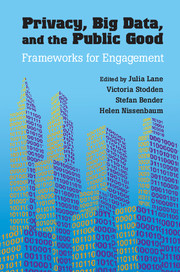Part II - Practical Framework
Published online by Cambridge University Press: 05 July 2014
Summary
Practical Framework
The essays in this part of the book make powerful arguments for the value of data in the public sector. We are all aware of their value to the private sector; indeed, the market advantage of many of large companies in the United States, such as Google, Facebook, and Yahoo, lies in their access to large datasets on individual behavior, and their ability to turn data into privately held information. Yet the experience of the authors demonstrates that the gap between vision and reality in the public sector is large, for many reasons. The authors identify new approaches that can enable public sector custodians to combine and use data, and new approaches to enable researcher access so that data can be turned into publicly held information. A major leitmotif in each chapter is, of course, trust.
What is the vision? An illustrative, but not exhaustive, list identified by the authors of the potential and actual value of big data range from simply better, more targeted city management to reduced taxpayer cost and burden, from great transparency and less corruption to greater economic growth, and indeed to addressing problems of epidemics, climate change, and pollution. Interestingly, as Elias points out, the European Commission recognized the value of data as far back as 1950, when the European Convention on Human Rights noted, “There shall be no interference by a public authority with the exercise of this right [to privacy] except such as in accordance with the law and is necessary in a democratic society in the interest of national security, public safety or the economic well-being of the country, for the protection of disorder or crime, for the protection of health or morals, or the protection of the rights and freedoms of others”(emphasis added).
- Type
- Chapter
- Information
- Privacy, Big Data, and the Public GoodFrameworks for Engagement, pp. 133 - 136Publisher: Cambridge University PressPrint publication year: 2014



